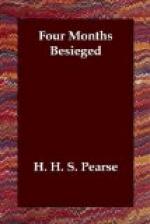Those six guns began throwing time-shrapnel with beautiful precision just where Boers were thickest. Not a shell seemed to be misplaced, so far as one could judge, and successive bursts and showers of shrapnel seemed to wither the immense thickets near Intombi’s crest. “Puffing Billy” turned with an angry growl on Abdy’s battery, and this was followed by many shells fired so rapidly that one began to think the gun must split under that strain. It went on firing, however, and shell after shell dropped close to our battery when it was unlimbered on an open space among mimosa trees. At last a shell burst under one of the guns, shrouding it and the gunners in a cloud of mingled smoke and mud. Everybody watched anxiously to see who was hit or what had happened. The gun, they thought, must surely be disabled, but just as they were saying so there came a flash out from that cloud. The artillerymen had coolly taken aim while splinters were flying round them or hitting comrades, and we saw the shell, aimed under those conditions, burst exactly in the right place. It was a splendid example of nerve and steadiness under difficulties, and some spectators, at least, cheered it with cries of “Well done, gunners.” So the 53rd Battery remained in action, doing splendid service by shelling the Boers on Intombi Spruit and beating back all attempts of Boer supports to scale the height that way. “Puffing Billy” went on firing from Bulwaan all this while, and is said to have got off over 120 rounds during the fight, but its shooting became very erratic and totally ineffective, while our guns were doing great execution.
[Illustration: THE BRITISH POSITION AT LADYSMITH, LOOKING EASTWARD]
It was from smaller Boer guns and Mauser rifles that the four companies of the Rifle Brigade suffered heavily in their attempt to drive the enemy from Caesar’s Camp plateau into Bester’s Valley. One party was smitten heavily while moving forward in a gallant advance to get within charging distance. The shattered remnant took cover behind a small ridge of stones, beyond which there was a little open ground, where Lieutenant Hall and another wounded officer lay. Repeated attempts made to bring in these officers failed, because directly a man lifted himself above the stones he became the target for twenty Boer rifles. The colour-sergeant of Mr. Hall’s company, however, crawled across that ground, to and fro, three times in as many hours, taking water to the wounded officers, who lay there under scorching sunshine, unable to move because even an uplifted hand was enough to draw the Boer fire on helpless wounded. Lieutenant Hall, whose arm was bleeding badly, turned over, apparently to bandage it, and another bullet struck him. Such was the fate of many brave fellows that day, whose stricken state should have appealed to the mercy of their enemies, but the Boers, unable to advance, and afraid to retreat so long as daylight lasted, were seemingly so suspicious of all movements that they saw in every wounded man a possible foe lurking there for his chance to get a shot at them. The same excuse, however, cannot be pleaded for one Free State burgher, who, lying down behind a maimed trooper of the Light Horse, kept up a fire to which our own men could not reply without fear of hitting their unlucky comrade.




